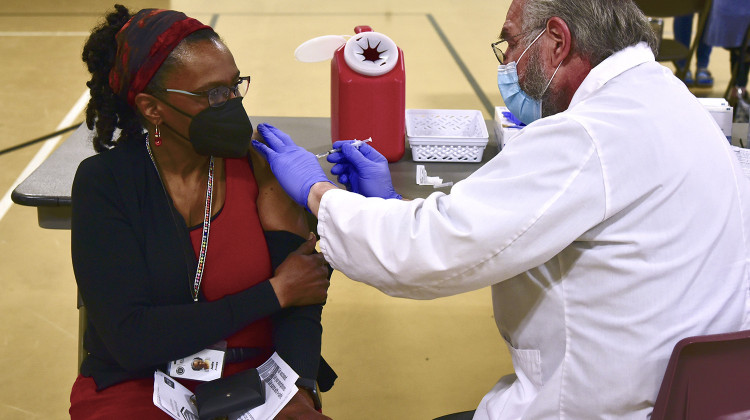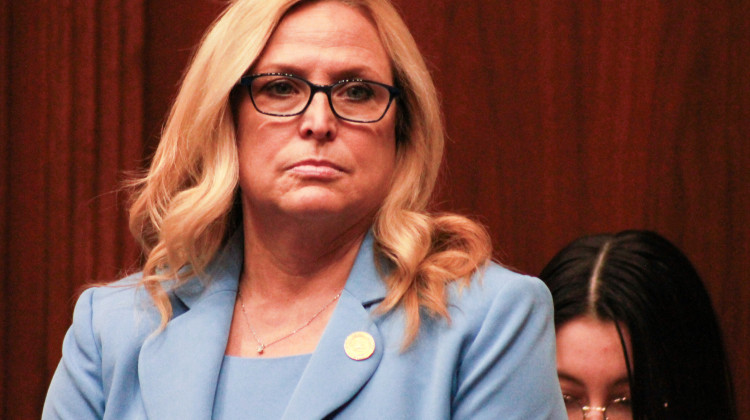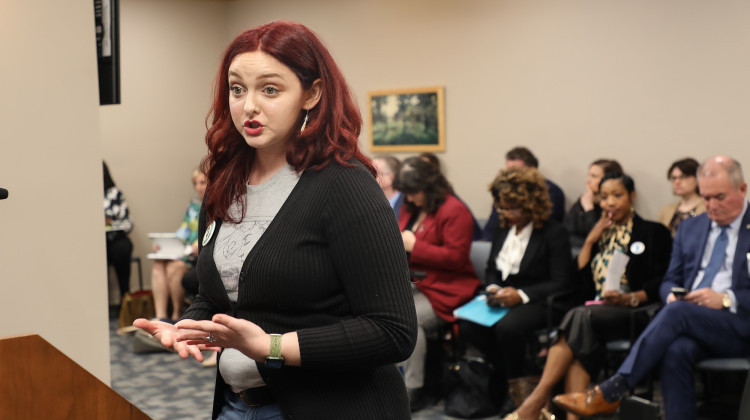
Indiana has administered 889,607 initial vaccine doses, with 436,849 Hoosiers fully vaccinated.
Justin Hicks/IPB NewsThe Indiana Department of Health reported 201 additional confirmed deaths over the last week. That brings the state’s total to 11,947 confirmed deaths. The state also reported more than 6,000 new cases in the last week – the fewest weekly reported total since early October.
Indiana has administered 889,607 initial vaccine doses, with 436,849 Hoosiers fully vaccinated.
Here are your statewide COVID-19 headlines from last week.
Indiana COVID-19 Vaccine Eligibility Expansion Delayed By Winter Storms
Indiana state health officials say cancellations because of the recent snowstorms have caused a delay in expanding eligibility for the COVID-19 vaccine.
More than 5,500 vaccination appointments had to be rescheduled because of severe weather last week. And the winter storm caused delays in vaccine shipments to Indiana.
Dr. Lindsay Weaver, Indiana Department of Health chief medical officer, said that meant the state couldn’t open eligibility to Hoosiers age 60 and older this week. But she said she hoped to expand to Hoosiers 60 to 64 within the next week.
Indiana Will Soon Launch New Rental Assistance Program With Federal Money
Indiana announced Wednesday it will soon open up a new emergency rental assistance program for Hoosiers in need
The program is made possible through $448 million sent to the state via the latest federal COVID-19 relief package.
READ MORE: How Will Indiana Distribute COVID-19 Vaccines? Here's What You Need To Know
Join the conversation and sign up for the Indiana Two-Way. Text "Indiana" to 73224. Your comments and questions in response to our weekly text help us find the answers you need on COVID-19 and other statewide issues.
Eligible households are ones in which at least one person qualifies for unemployment or had income loss during the pandemic. Eligibility could also include those who’ve incurred significant costs or experienced a financial hardship over the last year.
The household income must also be no more than 80 percent of the area median income – for a family of four, that’s about $58,000.
Governor Holcomb Signs COVID-19 Civil Liability Protections Bill Into Law
Indiana joined several other states in the country to protect businesses and other institutions from most COVID-19 lawsuits. While one small business advocacy group breathed a sigh of relief as Gov. Eric Holcomb signed the measure Thursday, some Hoosiers are concerned.
Senate Bill 1 requires an individual wanting to file a lawsuit to show evidence of gross negligence or willful or wanton misconduct. The legislation will shield certain groups from most COVID-19 lawsuits.
Several groups advocated heavily for the legislation including health care providers, schools and businesses. All urged protections from what they called financially harmful legal action.
Holcomb said in a statement the legislation will prevent “frivolous lawsuits” and help in the state’s recovery from the pandemic. He said he believes most Hoosier businesses and organizations have been doing the best they can to protect their employees and customers.
NCAA To Allow Some Fans At This Year's March Madness In Indiana
The NCAA announced Friday a limited number of fans will be permitted to attend this year’s Division I Men’s Basketball Championship. Each venue may allow up to 25 percent capacity with physical distancing.
The decision could let up to 17,500 people – including teams, families and fans – into Lucas Oil Stadium for games held at that venue.
Last month, officials announced all 67 games would be held in Indiana to limit team travel and keep athletes, coaches and staff safe during the pandemic.
In This Midwest State, Libraries Help With Vaccine Outreach
As the COVID vaccine rollout continues, Midwesterners have a lot of questions about distribution plans — and the vaccine itself. One state is getting help from a surprising place: public libraries.
Noble County is mostly rural and sits in the northeast corner of Indiana. When local officials looked for vaccination sites, they sought a place that was centrally located and accessible.
Library director Sandy Petrie knew the perfect fit.
“They're able to drive right up to the door,” Petrie says. “And, you know, they've got wheelchairs and walkers downstairs, but just the way we're set up, they're able to drop off, especially the elderly, like, literally three feet from the door.”
The library’s first floor conference rooms have been converted to storage, vaccination and waiting rooms, but Petrie says the changes have not altered operations.
“The beautiful thing about libraries, we're one of the only government entities that doesn't operate inside a box, we don't have these defined parameters about what we can be for our communities,” Petrie says. “We are what our communities need us to be.”
Indiana Library Federation Director Lucinda Nord says libraries have evolved to help communities throughout the pandemic. In the fall, they started working with the state to see what they could do once vaccines were available.
Indiana Senate Rolling Back Some COVID-19 Precautions
The Indiana Senate is scaling back some of the COVID-19 precautions it implemented for this year’s legislative session.
Senate President Pro Tem Rodric Bray (R-Martinsville) said the improving COVID-19 numbers across the state prompted the change.
The Senate has staggered its staff throughout session – half at home, half in the office – to avoid losing lots of people to quarantine if an outbreak occurred. Now, all staff will work in-person the whole week.
And Bray said people wishing to testify in Senate committees will now do so in the same room as senators. Lawmakers and people testifying had been in separate rooms – connected via video stream – up to now.
Bill Would Block Future Election Changes By Governor, Election Commission
Indiana’s governor and Election Commission would be blocked from ever again changing how and when an election is conducted under a bill passed by a Senate committee.
The measure is a reaction to the 2020 Indiana primary election, conducted during the COVID-19 pandemic.
Gov. Eric Holcomb and the Indiana Election Commission pushed back that primary, from May to June, and expanded vote-by-mail to anyone who wanted it.
Proposed legislation would bar that from happening again. Instead, only the legislature could make such changes.
Senate Bill Would Severely Limit Governor’s Power To Declare Emergencies
The governor’s authority to declare disaster emergencies would be severely restricted under legislation unanimously approved by a Senate committee Tuesday.
The measure – one of several this legislative session – is a reaction to executive orders issued by Gov. Eric Holcomb during the COVID-19 pandemic.
Sen. Sue Glick’s (R-LaGrange) bill would only allow the governor to declare a widespread emergency, affecting at least 10 counties, for 45 days without the General Assembly getting to weigh in.
If the legislature is in session – or gets called into special session by the governor – the emergency could go for 60 days. But after that, Glick said only lawmakers could extend the emergency declaration further.
Contact Lauren at lchapman@wfyi.org or follow her on Twitter at @laurenechapman_.
 DONATE
DONATE






 Support WFYI. We can't do it without you.
Support WFYI. We can't do it without you.